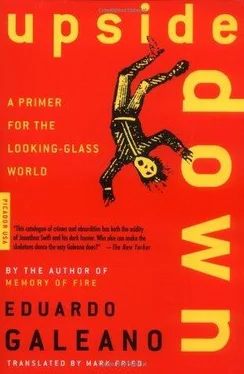Saint Cajetan, patron saint of the unemployed, is the most popular saint in Argentina. Crowds come to him begging for work. No other saint, male or female, has such a large clientele. Between May and October 1997, when new jobs suddenly appeared paying two hundred dollars a month, many wondered who was responsible, Saint Cajetan or democracy. With legislative elections on the horizon, the Argentine government astonished the saint by handing out half a million jobs right and left. But they didn’t last much beyond the campaign. Some time later, President Menem suggested that Argentines take up golf, because it’s relaxing and keeps your mind off your troubles.
The number of unemployed keeps on growing. The world has more and more surplus people. What will the owners of the planet do with so much useless humanity? Send them to the moon? At the beginning of 1998, huge demonstrations in France, Germany, Italy, and other European countries made headlines around the globe. Some of the marchers acted out the drama of labor in today’s world and wore black plastic garbage bags. In Europe there may still be insurance to ease the fate of the unemployed, but the fact remains that even there one young person in every four cannot find a steady job. Work under the table and outside the law has tripled in Europe over the past quarter century. In Great Britain there are more and more stay-at-home workers, always available, who don’t earn a thing until that telephone rings. Then they work for a while for an employment agency and go back home to wait for the phone to ring again.
Globalization is a magic galleon that spirits factories away to poor countries. Technology, so dizzying in its ability to reduce the labor time needed to produce anything, impoverishes and oppresses workers instead of liberating them from need and servitude. And labor is no longer necessary for making money. No need to transform raw materials, no need to lay a finger on them, since money is more fertile when it makes love to itself. Siemens, one of the largest industrial companies in the world, earns more from its financial investments than from its productive activities.
In the United States, there is a lot less unemployment than in Europe, but new jobs are temporary, poorly paid, and without benefits. “I see it in my students,” says Noam Chomsky. “They’re afraid that if they don’t behave themselves they’ll never get a job, and that has a disciplinary effect on them.” At the five hundred largest U.S. companies, only one worker in ten has the privilege of a permanent, full-time job. In Great Britain, nine of every ten new jobs are temporary; in France, eight of every ten. History is leaping two centuries, but backwards: most workers in today’s world have neither job stability nor the right to severance, and job insecurity drives wages down. Six out of every ten North Americans are earning less than they did a quarter century ago, even though the U.S. economy has grown 40 percent over the past twenty-five years.
Despite this, thousands and thousands of Mexican braceros, the “wetbacks,” continue crossing the river that marks the border, risking their hides in search of a better life. In a couple of decades the ratio of U.S. to Mexican wages has doubled. The U.S. average used to be four times the Mexican; now it’s eight. As is well known by those whose investments migrate south in search of cheap labor, and the cheap labor that tries to migrate north, in Mexico work is the only commodity whose price goes down every month. Over the past twenty years, a good part of the middle class has fallen into poverty, the poor have fallen into misery, and the miserable have fallen off the charts. The law guarantees job stability for those who have jobs, but in reality it depends on the Virgin of Guadalupe.

Along with unemployment, job insecurity is the principal factor underlying the decline in pay, and it’s as common as the flu. No one is safe. Not even skilled workers in the most sophisticated and dynamic sectors of the world economy can breathe easy. There, too, contracting and piecework are rapidly replacing steady jobs. In telecommunications and electronics, “virtual companies” already operate with only a handful of employees. Tasks are carried out from computer to computer. Workers never meet one another or their employers, those fugitive ghosts who owe obedience to the laws of no nation. Highly skilled professionals — the poster children you see in magazines that praise the miracles of technology in an era of universal happiness — are condemned to uncertainty and job instability just like any poor kid, even though they earn much more.
Fear of losing your job and terror at the prospect of never finding one can’t be separated from a ridiculous statistic that could only seem normal in a world gone mad: over the past thirty years, formal working hours, which tend to be less than real hours worked, have gone up significantly in the United States, Canada, and Japan and diminished only slightly in a few European countries. This trend constitutes a treacherous attack on common sense by the upside-down world: the astonishing increase in productivity wrought by the technological revolution not only fails to raise wages but doesn’t even diminish working hours in countries with state-of-the-art machines. In the United States, frequent polls indicate that work, far more than divorce or the fear of death, is the principal source of stress, and in Japan karoshi, overwork, kills ten thousand people a year.
Capitalist Realism
Lee Iacocca, once a star executive at Chrysler Corporation, visited Buenos Aires at the end of 1993. At a press conference he spoke with admirable sincerity about unemployment and education: “The problem of unemployment is a tough one. Today we can make twice as many cars with the same number of people. When they talk about improving people’s educational levels as a solution to the problem of unemployment, I’m always bothered by the memory of what happened in Germany. Education was put forward as the solution to unemployment, and the result was hundreds of thousands of frustrated professionals who then turned to socialism and rebellion. It’s not easy for me to admit, but I wonder if it wouldn’t be better for the unemployed to smarten up and go straight to McDonald’s to find a job.”
When the French government decided in May 1998 to reduce the workweek from thirty-nine to thirty-five hours, offering a basic lesson in common sense, the measure set off cries of protest from businessmen, politicians, and technocrats. In Switzerland, where unemployment is not a problem, I witnessed an event some time ago that left me dumbfounded. A referendum was held on reducing working hours with no reduction in pay, and the Swiss voted the proposal down. I recall that I could not comprehend the result at the time. I confess I still don’t. Work has been a universal obligation ever since God sentenced Adam to earn his daily bread by the sweat of his brow, but we don’t have to take God’s will so literally. I suspect that this urge to work has something to do with fear of unemployment — though in Switzerland unemployment is an abstract threat — and with fear of free time. To be is to be useful; to be you have to be salable. Time that isn’t money, free time lived for the pleasure of living and not dutifully in order to produce, provokes fear. There’s nothing new about that. Along with greed, fear has always been the most active engine of the system that used to be called capitalism.
Fear of unemployment allows a mockery to be made of labor rights. The eight-hour day no longer belongs to the realm of law but to literature, where it shines among other works of surrealist poetry. And such things as employer contributions to pensions, medical benefits, workers’ compensation, vacation pay, Christmas bonuses, and dependents’ allowances are relics that belong in an archeological museum. Legally consecrated universal labor rights came about in other times, born of other fears: the fear of strikes and of the social revolution that seemed so close at hand. The powerful who trembled in fear yesterday are the powerful who strike fear today, and thus the fruits of two centuries of labor struggle get raffled off before you can say good-bye.
Читать дальше












